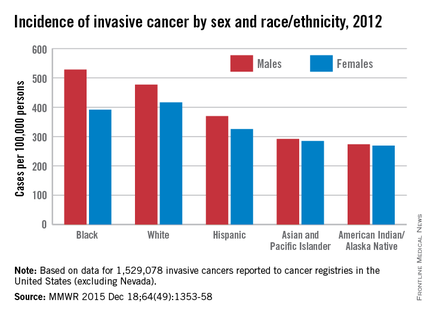The overall incidence of invasive cancer in the United States was 440.3 per 100,000 persons for 2012, the Centers for Disease Control and Prevention reported Dec. 17.
More than 1.5 million such cancers were reported to 49 state registries (excluding Nevada) and the District of Columbia in 2012. Invasive cancers include all cancers excluding basal and squamous cell skin cancers and excluding all in situ cancers other than those of the urinary bladder, the CDC investigators said (MMWR. 2015 Dec 18;64[49]:1353-58).
The incidence rate was higher for men (483 per 100,000) than women (412), and was higher for blacks (446) than other races/ethnicities. Blacks had the highest rate (528) among men – almost twice as high as that of American Indians/Alaska Natives (274). Black women, however, had a lower rate (391) than did whites (417), with American Indian/Alaska Natives having the lowest rate (269) among all women by race/ethnicity, the investigators reported.
By cancer site, incidence rates were highest for the female breast (122 per 100,000 females), prostate (105 per 100,000 men), lung/bronchus (60 per 100,000), and colon/rectum (39 per 100,000). These four sites accounted for about half of all the invasive cancers diagnosed in 2012, the investigators noted.
Overall 5-year survival for invasive cancer is 66% for both men and women. Survival rates for the four most common cancers were 88% for female breast, 97% for prostate, 18% for lung/bronchus, and 64% for colon/rectum, according to data from the National Program of Cancer Registries for 27 states from 2001 to 2011.


